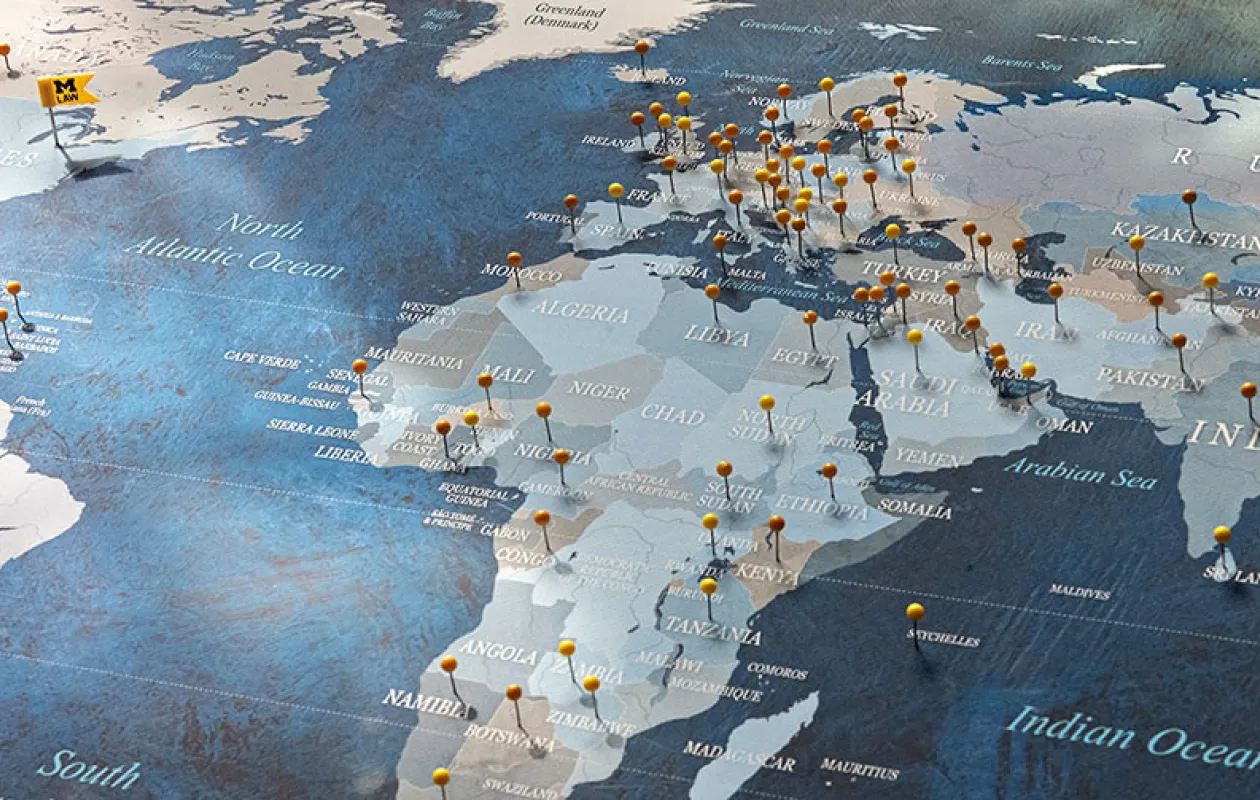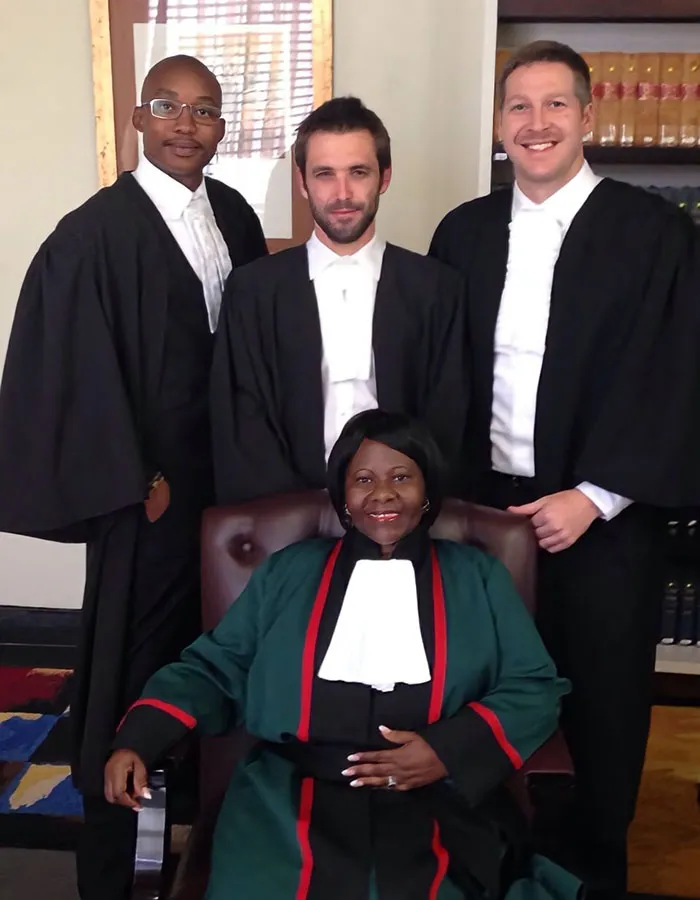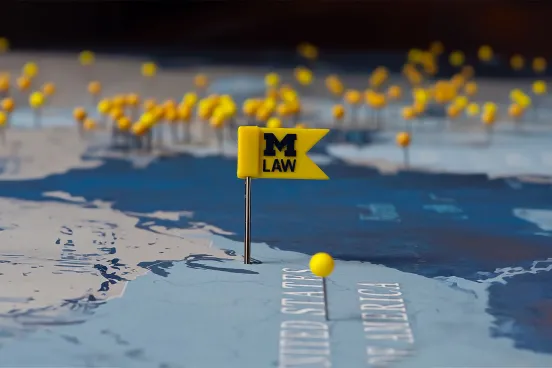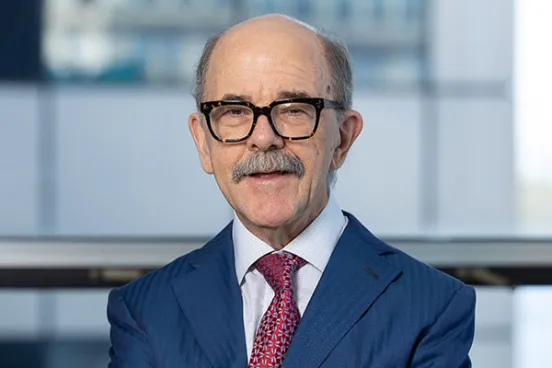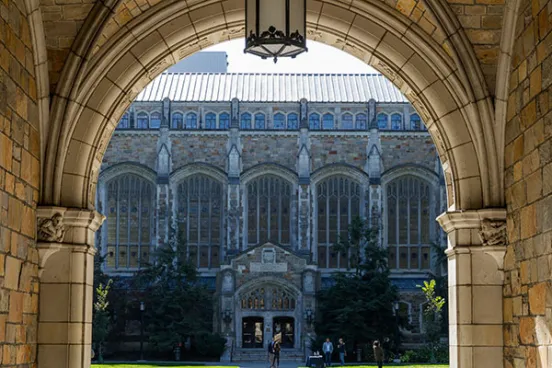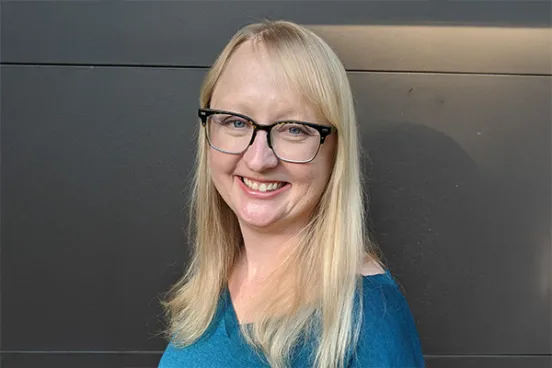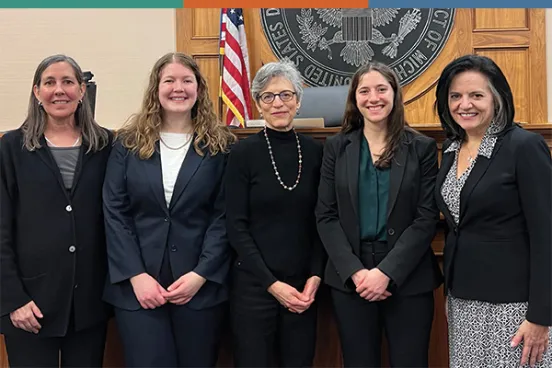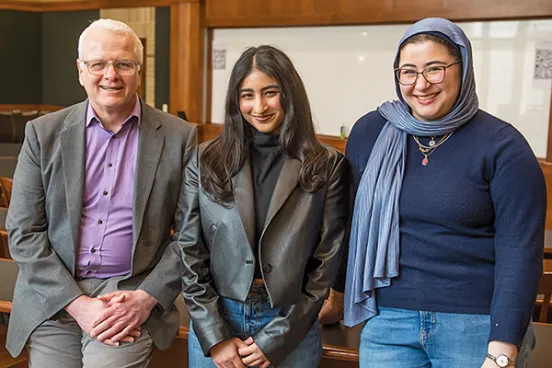It all began with a few innocuous paragraphs in the “Notices” section on page 3 of the October 19, 1983, edition of Res Gestae, the Law School’s student newspaper. Squeezed alongside details of the upcoming National Lawyers’ Guild potluck and a call for students to update their permanent addresses and phone numbers (by manually correcting the listings that lay printed on a table outside Hutchins 100!) was this:
“The Law School has received an endowment, the income of which is to be used for assisting law students who have had two or more years of law study to travel abroad for study or work experience…. Students do not need to have a track record of experience abroad to be considered.”
In the 40 years since, that endowment, the Clara Belfield and Henry Bates Overseas Fellowship, has supported nearly 400 Michigan Law students and alumni in their international pursuits, including internship positions at myriad international institutions, independent research, and teaching. Bates Fellows range from rising 3Ls to alumni. Projects vary in length from a few weeks to a full year.
We celebrate the 40th anniversary of this cornerstone of Michigan Law’s global offerings through the reflections of some former Bates Fellows.
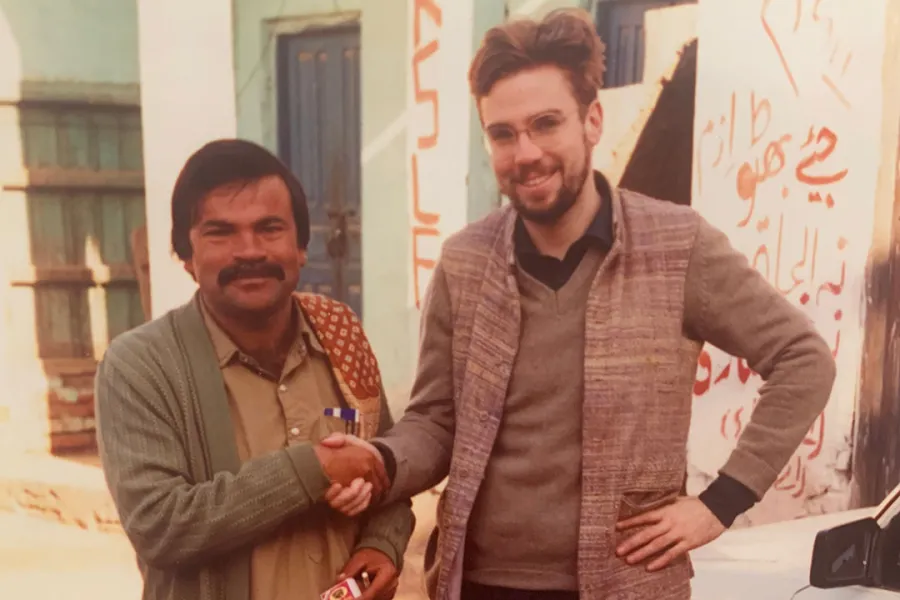
“My favorite memory was looking out over the city and lake in Geneva after a long day working at UNHCR and realizing this was the work, the organization, and the place where I wanted to make my life.”
—Steven Corliss, JD/MPP ’88, director for change, United Nations High Commissioner for Refugees (UNHCR). His work as a Bates Fellow sought to clarify the principles of international law that apply to stowaway asylum-seekers aboard ships at sea. Apart from a three-year hiatus in private practice, he has been with UNHCR throughout his 31-year career. UNHCR took him to Bosnia during the war and on assignments to Turkey, Yemen, Tanzania, and Bangladesh, as well as short deployments around the world. He is pictured in Pakistan on his first assignment after joining UNHCR full time.
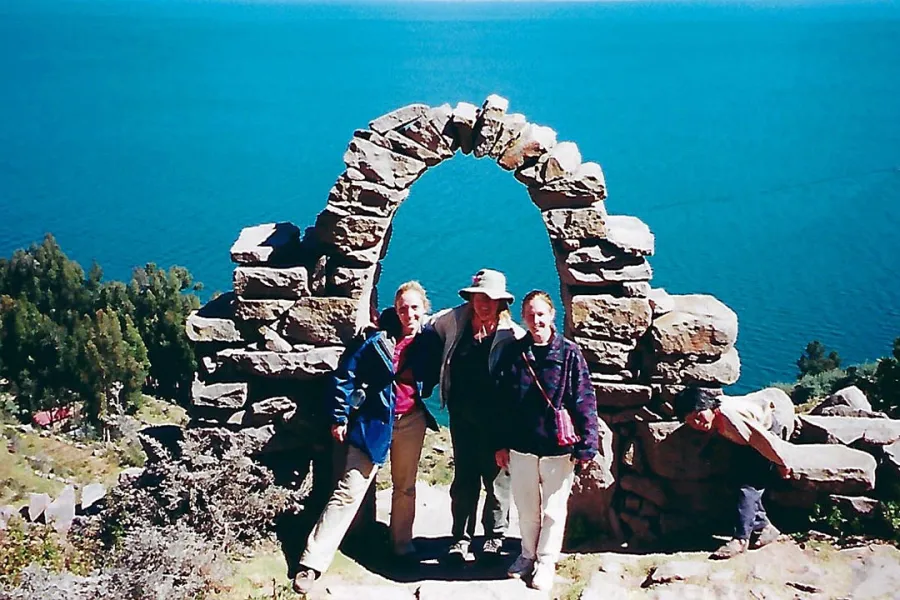
“I learned the importance of studying the law in action as well as in the books. My work as a Bates Fellow has enhanced my ability to teach American Indian Law because I can share my experiences with students.”
—Kirsten Matoy Carlson, ’03, professor of law, Wayne State University. She worked with Indigenous communities in South and Central America as a staff attorney at the Indian Law Resource Center, which represents Indigenous peoples at the United Nations and Organization of American States. She is pictured (far right) on Isla del Sol in Lake Titicaca, on the Bolivia-Peru border.
“I created much of the program that I worked on. It required assessing the needs of a community and working with the community to develop a solution. In my current role, I similarly have to guide our nonprofit in determining what we will work on, who we will work with, and ultimately what we will create.”
—Rory Pulvino, JD/MPP ’15, director of analytics, Justice Innovation Lab. As a Bates Fellow, he worked on legal analysis of land rights issues affecting a number of small tribes in Kenya, including creating the framework for an ongoing survey of the tribes for use in future quantitative research.
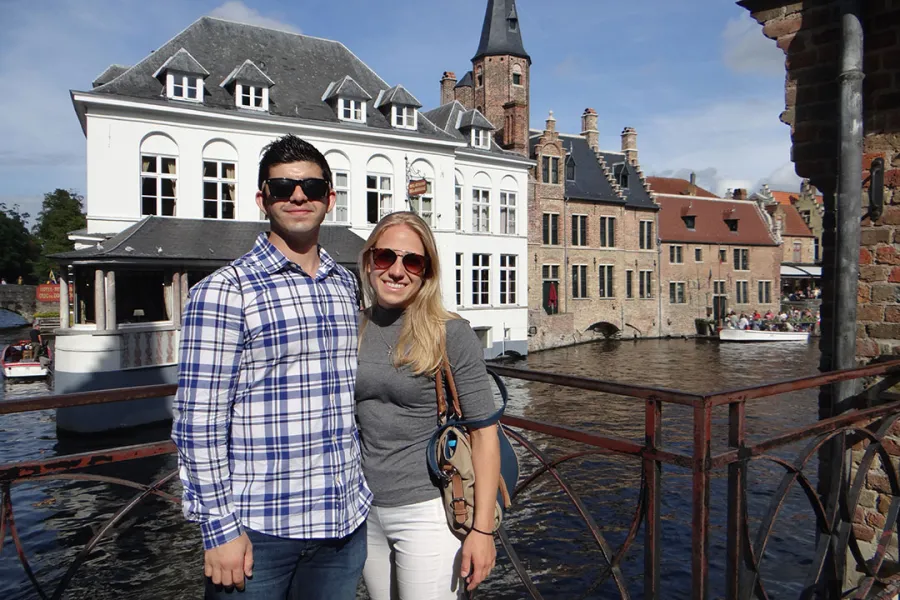
“It wasn’t lost on me that maybe I had no business going to Europe and telling European regulators and attorneys for the Union of European Football Associations (UEFA) that certain UEFA regulations couldn’t withstand legal scrutiny. But I did.”
—Jesse Kalashyan, ’17, corporate associate, Goodwin Procter LLP. He researched European Union antitrust and competition laws as they applied to sports. His article, “The Game Behind the Game: UEFA's Financial Fair Play Regulations and the Need to Field a Substitute,” was published in the European Competition Journal in 2021. He is pictured with Jenna Kalashyan, ’17, in Bruges, Belgium.
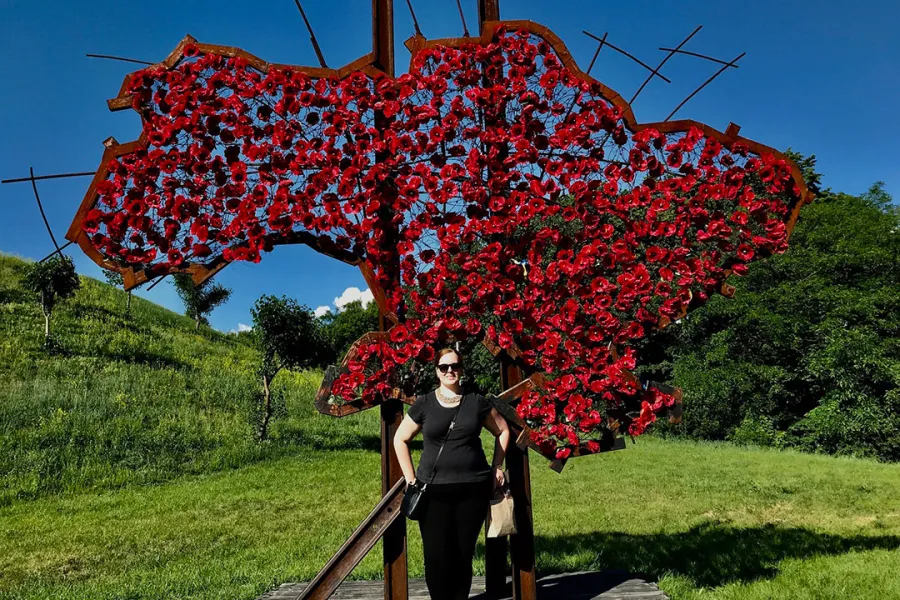
“The people I met demonstrated bravery in the face of great risk—and continue to do so as their cities are attacked—because they believe so strongly in justice and Ukrainian democracy. I aspire to reflect those values in my work, and I believe my experience has made me a better prosecutor than I would have been otherwise.”
—Kaley Hanenkrat, JD/MA ’20, assistant district attorney, Appeals Bureau, Kings County [NY] District Attorney's Office. She volunteered with two nongovernmental organizations in Kyiv, exploring the development of the legal infrastructure to support anticorruption reforms. She is pictured at the National Museum of the History of Ukraine in the Second World War.
“My experience reinforced my commitment to exploring creative avenues for advancing women's rights and racial justice, and empowering people in their own communities with the conflict resolution skills and capacity to resolve issues as they arise. I learned to play the long game when working to change complex systems that are resistant to transformation or innovation.”
—Elissa Barrett, ’98, executive director, Western Justice Center Foundation. The focus of her Bates Fellowship included the advancement of women’s rights in the nascent nation-state of Palestine during the period of the Oslo Accords.
“I discovered my ikigai, or reason for being: to solve problems at scale using tech-based solutions. My favorite memory is seeing the eyes of founders light up when discussing their ideas on revolutionizing education.”
—Rakesh Patel, ’15, founder, Sashakt LLC, a software consulting firm. As a Bates Fellow, he analyzed the growth and impact of educational technology companies on higher education in India.
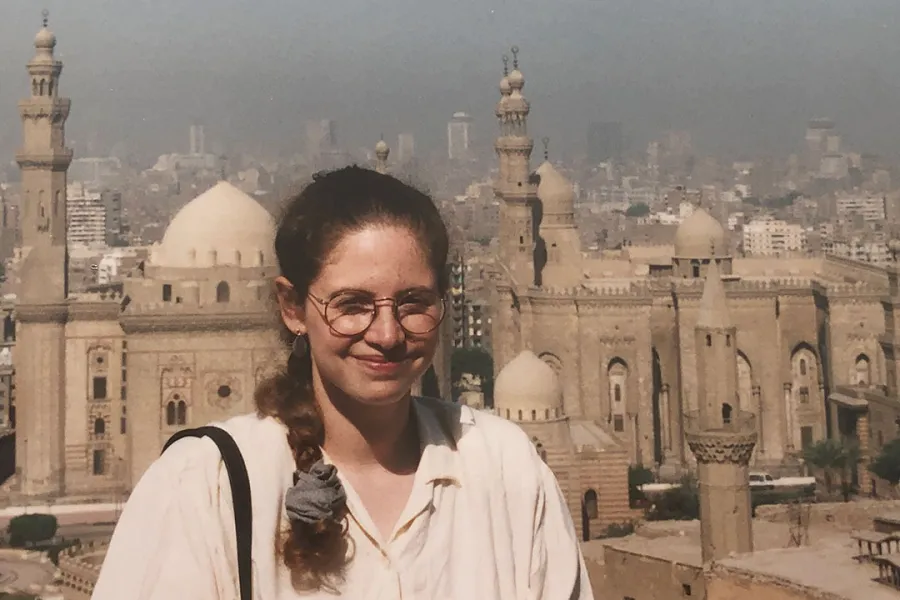
“Each of my Bates Fellowships played a critical role in my development as a human rights lawyer. In 1992, I went to study human rights in Algeria, my father’s home country, where I in part grew up, during the then-recently declared State of Emergency. When I arrived, I learned that the situation of women was at the heart of the unfolding struggle against violent religious fundamentalists, and I shifted the focus of my research to examine that. I came to understand how important it is to consult local human rights defenders in determining priorities, rather than simply imposing your own agenda. In 1994, I headed to the West Bank to work with the Women, Justice and Law project of Al Haq, the West Bank affiliate of the International Commission of Jurists and one of the most important Palestinian human rights organizations. I worked on human rights issues related to family law, including through a comparative approach considering the Algerian experience.”
—Karima Bennoune, ’94, Lewis M. Simes Professor of Law, Michigan Law. Her research during her first fellowship led to “Between Betrayal and Betrayal: Fundamentalism, Family Law and Feminist Struggle in Algeria,” published in Arab Studies Quarterly. The article won the Ziad Asali Student Scholar Award from the Association of Arab American University Graduates. She is pictured in Cairo during her second fellowship.
“On one occasion, I was surprised by a massive rainstorm and showed up at my clients' door completely drenched. They gave me delicious lentil soup and a dry pair of socks. I think often about their insistence on hospitality even in their difficult circumstances.”
—Betsy Fisher, ’14, US director, Talent Beyond Boundaries, and lecturer, Michigan Law. As a Bates Fellow with the International Refugee Assistance Project (IRAP), based in Amman, Jordan, she developed IRAP’s screening and intake process and provided direct representation to refugees in US resettlement processes as well as those seeking recognition of their refugee status with UNHCR. She then worked full time for IRAP for close to eight years.
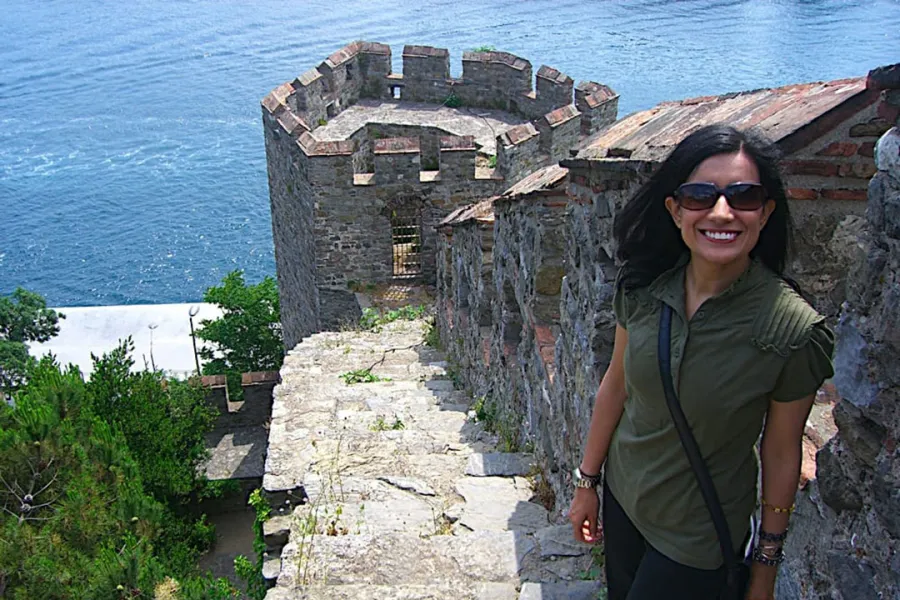
“I had never been to Turkey and didn't know the first thing about finance. I arrived in a city of 12 million people, not knowing a single one of them or a word of the language that most everyone outside of work principally communicated in. In many ways, it was the hardest thing I've ever done. I remember crying endlessly in my early days there, but I resolved to make the best of my situation. I realized that there was a complete freedom in being somewhere where no one knew you or had any expectation—good or bad—of you. As a result, I was able to explore who I was in a way I never had before, and I learned that we are as strong as we allow ourselves to be. I can almost see my 25-year-old self sitting [on the ferry on the Bosphorus], so scared of how my career and life would turn out. I wish I could tell her that the Bates was just the beginning of a great adventure.”
—Sumeera Younis, ’08, senior special counsel, Division of Investment Management, Securities and Exchange Commission. After her Bates Fellowship at the International Finance Corporation in Istanbul, Turkey, ended, she remained with the organization for another year and a half.
“My experience as a Bates Fellow gave me my first job.”
—Luke Wilson, ’19, researcher, US Commission on International Religious Freedom. After Wilson served seven months as a Bates Fellow, the government of Fiji offered him a job as a human rights research officer at the Permanent Mission of Fiji to the United Nations, where he continued his work negotiating resolutions, conducting legal analysis, and participating in various Geneva-based human rights mechanisms.


